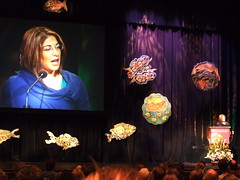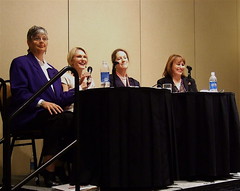Peak Greed
In Dante's Inferno the bankers share the same level of hell as homosexuals—for the sin of usury. Go figure. For decades, right wing Christians have tried to explain to America how homosexuals would rip off the covenant of marriage, defile it in some way that I may never understand. Bankers meanwhile were left to the government to look after.
A fine job they did. Oh but we didn't count on the dishonesty of bankers, said Alan Greenspan. Apparently in all his years of watching money come and go, Mr. Greenspan was never acquainted with the sin of greed.
At one time I decided to give greed a chance, immerse myself in it by devoting all of my waking hours to the study of money. If bankers and I were sharing the same floor of Hell, such an obsession couldn't be all bad. Maybe Hell just needed a makeover. We could spruce it up, refinance it, remodel... Money would redeem me. Money would tell the world I was a success. Money would be the universe heaping abundance upon me for doing what I loved, which was not to work, not in the conventional manner at any rate. Then I would do good with all that money and thus redeem myself again in the spirit of a true Silicon Valley entrepreneur.
It took me a year of reading before I was satisfied that I knew the basics—Suzie Orman, Rich Dad Poor Dad, Seven Laws of Money, Unconditional Money, The Soul of Money, spiritual guides to wealth and abundance, books on the law of attraction, money as energy, money as the secret power of the universe.
I invested in stocks, tech stocks mostly. It was a heady time to be greedy. I made four times my money on Yahoo, but kicked myself because it would later be ten times that and more. The regrets of greed kept me going more than the losses. Somewhere, somehow this would pay off.
After The Bust
When the bust derailed my money express train down a mountain and crashed into a tree, I was relieved that I wasn't hurt. I wasn't in debt; I hadn't borrowed on margin and I had paid my capital gains tax. But I had been foolish. I had no business being in the market at all. I didn't know enough about it. I needed to get some training in this lull here.
I armed myself with a subscription to Investors Business Daily. And because greed was about speculation on bubbles and news, I spent a few more bucks on a course, full of inspirational speakers, that would teach me what amounted to day trading techniques. I woke up at 6 a.m. to watch the market open. I researched companies, reading every possible story of rags to riches. And I traded. If a stock I bought went down significantly I felt like my dog had died. If it was up I was elated.
At about 8 a.m. I would try to shake off these emotional hallucinations and live my life. What was left of it. The emotional havoc I was experiencing made my life into a low grade of hell while I subsisted on an anemic diet of stories about how the best and the brightest people in the land devoted their days to trying to figure out how they could get more market share for their widget. All I could talk about were ideas that made people rich.
And because making money was about ego, what I most feared was that I would look like a fool. And what would most humble me was that I could not master this game. I was failing miserably at it. Plus figuring out my taxes was a nightmare. In fact recording all those losses in red ink bleeding down pages and pages of binder paper was what put an end to it for me. I sold all my holdings before I had to account for another tax year of losses. I confessed my failure to a select few of my friends. The shame was mine to keep.
My subscription to Investors Business Daily—that rag of unabashed greed—I let pile up in disgust until it stopped coming. Reading it had taught me much about what this national obsession with greed looked like. No amount of philanthropy could make up for the guiding principles expressed in those pages.
For one thing an economy that relied so heavily on consumer spending, buying mountains of what amounted to crap basically, was one sick puppy of a way to conduct a relationship with the planet. If people stopped buying stuff they didn't need and just learned to be happy, this economy would topple.
And for another thing this boom/bust phenomena that drove the market wild with greed, made me crazy with the wasted resources. As internet stocks moved through the valley with their feverish mania, renting every square foot of office space to be had and filling all the restaurants with cocky, over paid, overextended, new BMW owners, I worked a lot of hours putting offices together, only to come back within the year to help liquidate them. The office manager had an ulcer by the end of it. Which was a good thing if you were into pharmaceutical and health care stocks. Talk about sick and twisted.
When policies of the Bush presidency made the US unpopular overseas (equivalent to a 2% drop in sales of American name brands), the biggest corporations got together to take a survey of what was making us unpopular. They got it right about the Kyoto accord, the Iraq war, etc, etc. And in their collective wisdom they decided a publicity campaign was in order (funded by Coca Cola). It would be aimed at young people going overseas. They would arm them with music CDs, sponsored by their brand, hoping that these young people would endow them with coolness and the kids would talk up their products to their international counterparts. How morally bankrupt was that? Were all the underlying stories of our nation about profit?
The Environmental Solution
Around this time, I enrolled in the Northwest Earth Institute course "Choices In Sustainable Living" being held in Palo Alto at the Foundation of Global Community. When I read about the story of Easter Island for the course, I brought a copy of Investors Business Daily to the next class, slapped it down on the table and declared that the big heads of our own Easter Island had corporate names. I told them the story of the free CDs as an example of how little corporations cared. My college age classmates looked at my name on the mailing label and then at me as one would a mutant.
An older man at the table, of retirement age, told the class that he liked to read his subscription of IBD online. That way he was saving trees. No one else ventured to offer a response to my declaration. Most knew that everyone who hoped to retire in the US would invest their 401K in the stock market. You just weren't supposed to look at it too closely. Like eating sausages, you don't want to know what's in them.
I was stymied. Don't you get it? I wanted to shout. All of our resources are being fed to the false gods of corporations. Whoever it was on Easter Island who cut down the last tree probably believed in a trickle down economic ideology too. Why was everyone so sold on the free market? Why couldn't we have government policies that put limits on this economy of excess? Why were people so identified with corporate freedom?
Shortly after I completed this course, Richard Heinberg conducted a workshop, in the same venue, on peak oil. I understood all too clearly, then, that this economy would flunk without the growth promised by ever increasing supplies of cheap fossil fuels. Should I rejoice that this would put a stop to the ongoing rape of the planet while we scrambled to find a renewable energy source? The only solutions being offered by environmentalist were to make companies more Green. We would appeal to the environmentalists within who would green the companies from the inside. Make the market work for us with incentives for green venture capital and cap and trade systems. I was skeptical. The dollar was the only thing green about corporate America.
Journey of Answers
Had America always been so free market happy?
From the movie The Corporation, I learned, that companies once had to operate by charters that were written for the benefit of the community supporting that business. Citizens had the power to refuse to renew the charters of badly behaved companies. Then in a bureaucratic mistake corporations were given the rights of personhood without the responsibility, which allowed a psychopathic monster of greed to emerge. Those profiting from that greed, furthered the cause of their Frankenstein, by dismantling government regulation.
From Michael Parenti's "Against Empire" I learned about economic imperialism. From John Perkins' "Confessions of an Economic Hit Man", I learned how developing nations were lied to, to persuade them to accept unnecessarily large infrastructure projects that wouldn't pay off, which explained their huge debts. They had then been forced to open their markets to transnational corporations by the loan stipulations of the International Monetary Funds. I had seen as much from having been to Brazil with a political science major.
I learned too, how our universities had succumbed to funding from corporations and as a result carefully screened out professors who didn't espouse a pro free market line. Then there was Naomi Klein's book "Shock Doctrine: The Rise of Disaster Capitalism" to explain how the free market ideology of the neo-cons had been used to exploit disasters to put through unpopular government policies. Especially in South America where the people had voted in socialist leaders. I couldn't even say the word socialism in the US without being given a look of horror or confusion. Wasn't' that the government of a failed oppressive regime?
An American man once cornered me at a party when I was a junior in high school and told me that I owed the freedom of my country to the Vietnam War because of the Domino Theory and how it explained the dreaded spread of Communism. My sixteen-year-old-self refused to accept that my freedom justified war especially the Vietnam War. Why were Americans so afraid of Communism anyway?
I recently learned that US aid, in the '60s, was being given only to countries that could prove their support of anti-communist policies. This probably had a lot to do with Thailand's military government, of the time, issuing deeds as incentives to cut down the rain forest. The documents specified that Communist insurgents were said to be harboring in the forest. Having gone to that region of Thailand I knew this to be absurd. A forest dweller was an indigenous person not likely to be educated in such ideological constructs as Communism. He probably held in his mind that the forest was a resource that could not be owned because it was of benefit to everyone and should therefore belong to everyone like the river and the sky. It was, I would learn from Vandana Shiva's book "Earth Democracy", a commons.
The whole point of imperialism, colonialism and privatization under capitalism was to take away what was held in common by a people. This was done through the enclosure of the commons. People's minds had to be enclosed, too, to continue to make it possible for this to happen. A famous paper called "The Tragedy of the Commons" analyzed, with mathematical calculations, how a commons was only of benefit to a community if it was owned and managed for profit. Otherwise, it would be destroyed by everyone using it for their own benefit. Entire systems of democratically organized, decision-making protocol, operating around said commons, were ignored by men at their typewriters, pushing theories of human behavior as scientific fact. Huge assumptions were going down here about competition being the guiding principle of societies, not cooperation. I was beginning to see the light at the end of the tunnel.
There were no real truths, here, about human nature at all, not even economic truths. These were just ideas forced upon us and here we were going along with it, giving lip service to free market rhetoric. I longed for the day that the ideology of free market capitalism would become as abhorrent as the theory of eugenics. Given the recent financial unraveling, I may not have to wait very long.
The Road Home
As the market plummeted, I wanted to scream with the terror of it; my emotional memory kicking in with every day it dropped. As speculators fled, I knew they were doing so because the market was as broken as the melted wing that brought Icarus down. I was sure there would be no quick fixes. When the call went out for a bailout like a bucket brigade for a fire, I was glad that so many people called their congressman and said no. It was too much like the rush to war in Iraq (or maybe they, too, had read Shock Doctrine).
I argued with friends and clients who were financial professionals.
"We have to do something and quickly", they said. The market was now more important than money. It was the golden goose.
"But what about accountability? I asked. "And what if it doesn't work?"
"Well at least we tried," said one.
"It's been done before by Sweden," said another.
Luckily, Naomi Klein was in town. I saw her at Stanford, then at Bioneers. There was never a free market, Naomi told us, it was just a cover story for transferring wealth from the state to the private sector with all those no-bid contracts of crony capitalism and this bailout was meant to transfer the debt of the private sector to the public. This was to be the final gift of this administration. It was the Republican insurance policy for an Obama presidency. If he wanted money for anything at all they could say there was no money. We have to come up with a new income stream, she counseled, tax windfall profits, demand interest from the banks.
Each statement she made was a revelation as gratifying as a kiss. At Bioneers she made love to all of us lefty, save the planet, do-gooders.
"Imagine", she said, "that after all the struggles of trying to find funding for whatever project you are working on, you wake up one day to discover that you own the banks".
All we had to do was demand better terms. Take Argentina as our model, get out there and bang pots and pans until we get what we want, she urged. Hello Socialism. Suddenly the term was allowed again, bandied about on late night talk shows as a viable form of government. After all, we had partially nationalized the banks. Blogs were abuzz with talk of a new New Deal.
This crisis is an opportunity as much for us as for them, Naomi told us. The government is changing the rules and so can we. We have the opening to make this crisis into a moment of social justice. We must demand the changes we want to see. Ah, The Naomi Doctrine. Think what we could do with 40 billion if we nationalized Exxon, she suggested, turning our minds inside out. Revolution anyone?
Soon we will go to the polls to vote, yet again, on regulating the activities of homosexuals. Maybe later we will give some thought to properly regulating the bankers (again) and hopefully in our favor.
Labels: collapse, Consumerism, economy, homosexuals








